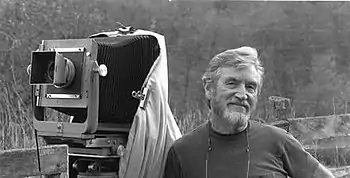Cole Weston
Cole Weston (January 30, 1919 – April 20, 2003) was photographer Edward Weston's fourth and youngest son. Although Weston "was born into the tradition of craftsman- produced black-and-white art photography, he was to find his own photographic direction in colour.".[1]
Cole Weston | |
|---|---|
 | |
| Born | January 30, 1919 |
| Died | April 20, 2003 (aged 84) Monterey, CA |
| Nationality | American |
| Known for | Fine Art Photography |
Notable work | Surf and Headlands |
| Spouse(s) | Dorothy Hermann, Helen Prosser, Margaret Woodward, Paulette Stubbs |
Cole Weston's life followed a diverse course that started with theater, later leading him to the Navy,[2][3] a position photographing for Life,[4] and later photographing portraits, before he moved to Carmel, California in 1946, at his father's request. In the years that followed, Cole became his father's assistant and trusted companion; and, as Edward's struggle with Parkinson's disease worsened, Cole became the keeper of two careers, his father's and his own.[1] Before his death in 2003, Cole Weston was devoted to keeping both bodies of work flourishing and circulating widely.[5][6][7]
Early life
Cole graduated with a degree in theater arts from the Cornish School in Seattle in 1937.[2] Cole served in the United States Navy during World War II as a welder and photographer[2] in Norman, OK.[3]
Assisting Edward Weston and discovering color (1946–1958)
Upon his discharge from the navy, Cole started photographing for Life in Southern California.[4] At the same time, Edward became increasingly crippled by Parkinson's Disease and wrote to Cole asking for his help with the printing of his negatives;[4][8] and so, in 1946, Cole and his wife moved to Carmel to help his ailing father in his darkroom and studio.[1][2] Cole and his brother Brett Weston printed their father's negatives under his supervision.[6][7]
At the time, Eastman Kodak sent their new color films Kodachrome and Ektachrome to Edward because they wanted him to "photograph Point Lobos in color" to which Edward responded: "Well, I don’t know anything about color, but I know Point Lobos better than any man alive".[5] With the leftover film, Cole began experimenting with the new medium and, in 1957, he created his first color prints of the California coastline.[2][9]
"I’m a color photographer. That’s what I do. Whether you like it or not, that’s what I do. There is nothing wrong with black and white, but I am into color. And I like it!"[5]
The second Forest Theater Guild
In 1971, Cole Weston established the second Forest Theater Guild in Carmel, CA and began directing productions on the outdoor stage during spring and summer months.[10] Weston worked with the Forest Theater Guild for 50 years in which he directed more than 30 plays and was involved with the physical construction of the Indoor Forest Theater[11][12] (a small theater beneath the outdoor stage) "hauling in the concrete and other building materials himself".[13]
Edward Weston's negatives and the Cole Weston Trust
In his will, Edward Weston left his negatives to Cole, who printed them[1][14] for more than 30 years. On September 30, 2014, a collection of 548 prints from Edward's negatives, printed posthumously by Cole, was auctioned by Sotheby's in New York.[15]
Publications
References
- Williams, Val (2003-05-02). "Cole Weston". The Independent. Retrieved 2017-03-27.
- "Cole Weston". edward-weston.com. Retrieved 2017-03-27.
- "Weston, Cole 1919- - Dictionary definition of Weston, Cole 1919–". www.encyclopedia.com. Retrieved 2017-03-28.
- Bethel, Denise. "EW/CWs: A Brief History". Sotheby's.
- "John Paul Caponigro :: Cole Weston (5/1/00)". www.johnpaulcaponigro.com. Retrieved 2017-03-28.
- "Edward Weston | International Photography Hall of Fame". International Photography Hall of Fame. Retrieved 2017-03-28.
- Weston, Maggi (2014). "Cole Weston and His Father's Legacy". Sotheby's.
- Weston, Edward, and Cole Weston. Laughing Eyes: A Book of Letters between Edward and Cole Weston, 1923–1946. Ed. Paulette Weston. Carmel, CA: Carmel Pub., 2000. Print.
- "Cole Weston". lumieregallery.net. Retrieved 2017-03-28.
- "Cole Weston Elected President; Forest Theater Guild Maps Ambitious Program." Monterey Peninsula Herald, July 29, 1971
- "Forest Theater a 'bohemian grove' for Shakespeare fans". SFGate. Retrieved 2017-03-28.
- Ryce, Walter. "The Forest Theater launches an ambitious season celebrating 100 years of incomparable culture-by-the-sea". Monterey County Weekly. Retrieved 2017-03-28.
- Fishkoff, Sue. "Carmel photographer, director and bon vivant is dead at 84". Monterey County Weekly. Retrieved 2017-03-28.
- Hagen, Charles (1992-03-03). "Critic's Notebook; Just How Sacred Should Photo Negatives Be?". The New York Times. ISSN 0362-4331. Retrieved 2017-03-28.
- Kozinn, Allan. "Edward Weston Photos to Be Auctioned". ArtsBeat. Retrieved 2017-03-28.
- Weston, Cole (1981). Cole Weston, eighteen photographs. Abe. ISBN 0879050845.
- Weston, Cole; Wolf, Paul (1998). Cole Weston: At Home and Abroad. Aperture. ISBN 0893817775.
- Weston, Cole (1991). Cole Weston, 50 Years. Salt Lake City: GIBBS SMITH.
- Jeffers, Robinson; Brower, David (editor) (1965). Not Man Apart: Photographs of the Big Sur Coast. San Francisco: Sierra Club. pp. Cover - Cole Weston's "Surf and Headlands".CS1 maint: extra text: authors list (link)
